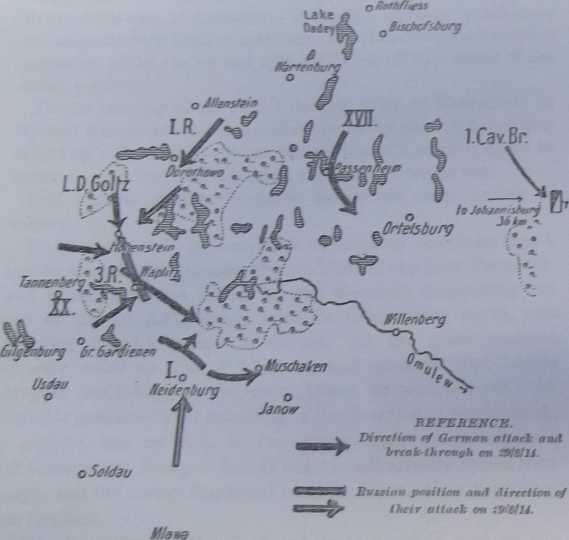DSCF5547
My War Memories, 1914-1918
The zoth Anny Corps was to carry out the attack wblch had been fiTwi for the 27th, and morę especially to push forward the 4ist Infantry Diyision. Von der GoItz’s Łandwehr Division was to
mJO
laniem

o
1-800000
r i f % v .* *
I kn. = | mile.
Fig, 3. TaaMDbcig, Pondem 00 Augusl 29tb, 1914.
i
attack Hohenstein. The ist RX. and the i7th A.C. were moved up west, covered against attack from Ortelsburg, to positions on a linę rnnning from AUenstein to Passenheim.
M
Tannenberg
Early on the 28 th, we went to Frogenan and took np statkm in the open at the eastern end of the vilłage. General von Scholtz was not far o£L A very ineffective field-telephone connected us with the ist AC., bot no conmranication at all was possible with the other forces.
Our first impressions were by no means favcmrable. Neiden-borg had certainly been taken, bot the 4ist Infantry Division had attacked Waplitz in a fog and been driven back. This division, which had snfiered heavy casnalties, was now holding positions west of Waplitz and anticipatmg a bostfle connter-attack with the greatest anjdety. I sent an officer there by car to give me a report on the condition of the diyisk/n, and his acconnt was not enconraging. The Landwehr near Mhhlen were not making progress. If the enemy attacked the r%ht wing of the 20th AC. in great force, a grave crisis might resolt. At the best, the battle would be prolonged,
Fmahy, Rennenkampf might march. Bnt the enemy madę no attack on the 4ist Infantry Division and the Niemen Army did not march.
Captain Bartenwerffer, of the Staff of the I7th AC., flew over the enemy lines, and brought good reports of the progress of his Corps in the enemy's rear. ,
During the aftemoon the sitnation changed to onr advantage. The yd Reserye Division, and later the 37th Infantry Division, gained ground west of Hohenstein; von der GolŁz’s Landwehr Division entered Hohenstein itself. The enemy front appeared to be wavering. General von Hindenburg wauted to drive on to Muhlen. We ran right into a temporaiy panie, created by Russian prisoners who were being taken to the rear in large numbers. This incident created an unfavonrable impression, as the disorder spread far to the rear.
In the evening we went to Osterode. Owing to an nnfortu-nate mobilization order the civil authorities had alieady left the town. This most have considerably inereased the anaiety of the civil population.
We were not at all elear as to how things stood with the indi-viduai units; bnt there was no donbt that the battle was won.
55
Wyszukiwarka
Podobne podstrony:
DSCF5552 My War Memories* 1914-1918 The supply columns and trains of the ist R.C. and the 27th A.C.,
DSCF5542 My War Memories, 1914-1918 was indeed very serious, but, aft er all, the problem was not in
DSCF5555 My War Memories, 1914-1918 meagre. Sonie of the officials had forsaken their posts. The wir
DSCF5557 My War Memories, 1914-1918 were the effect of the altered situation, and subseąuently prove
DSCF5541 My War Memories, 1914-1918 For a long time my mobilization orders had appointed me Director
DSCF5543 My War Memories, 1914-1918 most of his success at Gumbinnen and advance ąuickly, my plan wo
DSCF5551 My War Memories, 1914-1918 break-thrcmgh, an encircling movement, firm resolution to win an
DSCF5553 My War Memories, 1914-1918 had to wait and see wlietlier our main attack would succeed or f
DSCF5540 My War Memorles, 1914-1918 General von Stein, who was at that time Q\artennast.er-Gcneral,
DSCF5539 My War Memorles, 1914-1918 I came to Andenne, where I saw a gruesome tand distressing examp
DSCF5545 My War Memorles, 1914-1918 Anny was advanc.ing, its left wing in doholon, its 6tli Corps di
DSCF5546 My War MemorJes; 1914-1918 Von der Goltz’s Landwehr Diyision, which had been placed at our
DSCF5554 My War Memorles, 1914-1918 by front al and fianking attacks. Whilst at Tannenberg we took o
DSCF5556 My War Mcmoriea, 1014-1918 Th© order to retreat from the Mani© wus Issucul, whntluir on goo
CSG025 14 Complete Spanish Grammar My son Rob comes into the kitchen and listens to my instructions.
the bagasse of 7738 ± 100 kj/kg, as received. However, in most sugar mills, it is not possible to ca
skan0023 In the U.S., tornadoes ire responsible for 80 deaths and morę than 1,500 injuries each year
więcej podobnych podstron